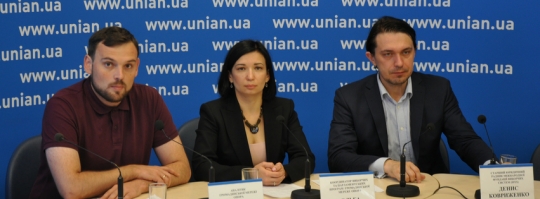Civil Network OPORA calls on the Verkhovna Rada of Ukraine to urgently consider President's submission of new CEC members and pass a decision in accordance with the Law of Ukraine on the Central Election Commission and the Rules of Parliamentary Procedure.
To secure openness of the process and public access to information, we suggest to conduct a public discussion in the nearest future concerning the priorities for activities of the CEC and directions of its reforming with consideration of nominees.
When the corresponding parliamentary committee finishes consideration, it should pass a decision concerning the nominees submitted by the President, and Members of Parliament should terminate the powers of current CEC members and appoint new members based on the results of a roll-call vote.
If the parliamentary factions are not ready to support all the nominees and doubt their qualification or independence, they can support only those they think deserve the appointment and start a political dialog with the President concerning a new submission. At the same time, the selection of such nominees should not be based on populist or political motives. The Parliament is also responsible for withholding of the decision and for the level of trust to the Commission and the institution of elections.
OPORA is convinced that any attempts to relate this issue to the problems with wider political agreements on other personnel or legislative issues in the Parliament are a demonstration of legal nihilism and low standards of parliamentary activities.
Public trust is essential for proper functioning of the CEC, but it will be difficult to gain it if the procedure of CEC members rotation depends on private political negotiations and interests.
According to the Law of Ukraine on the Central Election Commission, the CEC is a state collegial body, which functions independently from other state authorities, local self-government bodies, public officials and civil servants. Formation of its membership, as well as its duties and functioning are regulated by the Constitution, Law of Ukraine on the Central Election Commission and other laws. Rules of Procedure of the Verkhovna Rada of Ukraine (Article 209) establish the procedure of appointment and withdrawal of CEC members based on submission from the President of Ukraine. This procedure determines rules for consideration of President's submission and must be fulfilled by Ukrainian Parliament.
Ukrainian President and Parliament have already demonstrated their inaction in the matter of CEC member’s rotation for a long time already despite CEC members have had their seven-year term of office expired yet on 1 June 2014.
OPORA has already emphasized in its previous statements that the fact that President's submission of new CEC members lacked nominees from 3 of 6 factions and one group of MPs doesn't help to overcome the crisis in the CEC and to reach consensus between subjects in the Parliament. Moreover, it may result in unbalanced membership of the Commission.
However, the Parliament is still obliged to consider the nominees and take a decision despite President's submission has its drawbacks.
We would like to remind that Head of the Petro Poroshenko Bloc faction stated on 8 September 2016 briefing in the Parliament: “We are looking for a wider circle of suggestions. This issue may be widened and the CEC will be formed together with some other state body. The CEC cannot be formed by the coalition only. The CEC is a wider body and requires a wider consensus.”
The statement that leader of the largest parliamentary faction has made concerning consideration of CEC rotations together with formation of other government bodies creates preconditions for violation of CEC formation procedure, weakening of legislative guarantees of independence and professionalism of the Commission, and non-adherence to international standards of its impartiality as a body which organizes the elections.
We would like to emphasize that according to the Venice Commission's Guiding Principles for Elections, the CEC should have representatives of parliamentary political parties among its members, or parties that have gained the certain percentage of votes. Guiding Principles say that political parties should be equally represented in election commissions or have an opportunity to watch their activities. Thus, the fact that representatives of parliamentary factions or other parties may be included in the members of the CEC doesn't contradict the generally recognized principle of impartiality of the central election administration body, as long as its members shall act exclusively within their authority and in the manner established by the Constitution and the corresponding laws.
